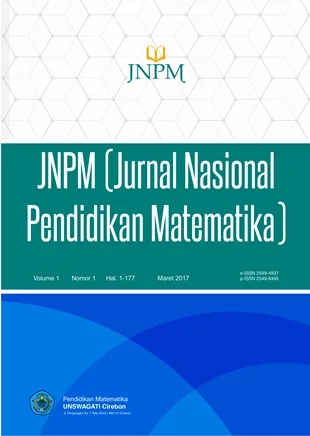Cognitive Load of Students on Logarithmic Material in Terms of Cognitive Style
DOI:
https://doi.org/10.33603/jnpm.v9i2.9907Keywords:
cognitive style, logarithm, field independent, field dependent, cognitive loadAbstract
This study aims to identify the cognitive load experienced by tenth-grade students on the topic of logarithms, considering their cognitive styles, namely field dependent (FD) and field independent (FI). The research adopts a qualitative approach with a descriptive design. The participants of this study consist of 38 tenth-grade students from a high school in Malang, grouped based on their cognitive styles: FD and FI. Data were collected through a cognitive style questionnaire (HFT Test), logarithmic tests, and in-depth interviews. Data analysis was conducted through data reduction, data presentation, and conclusion drawing. The findings reveal that students with a field dependent cognitive style tend to experience high intrinsic cognitive load, particularly due to confusion in understanding the numerous concepts that need to be applied. In contrast, students with a field independent cognitive style experience extrinsic and germane cognitive loads, reflected in their difficulties in applying already-learned concepts. This study highlights the significant role of cognitive styles in influencing students' cognitive load when solving mathematical problems. Strengthening prerequisite knowledge and providing additional practice are recommended to reduce cognitive load, especially for students with a field dependent cognitive style.
References
Achilla, S., Sugiyanti, & Komariyatun. (2024). Kemampuan Pemecahan Masalah Matematika Siswa dengan Gaya Kognitif Field Dependent dan Field Independent. Jurnal Pendidikan Tambusai, 8(2), 35001–35007.
Ayres, P., & Paas, F. (2012). Cognitive load theory: New directions and challenges. Applied Cognitive Psychology, 26(6), 827–832. https://doi.org/10.1002/acp.2882
Falah, B. N., Wijayanti, P., & Masriyah, M. (2022). Beban Kognitif Intrinsik Siswa Kepribadian Guardian dalam Memecahkan Masalah Matematika Ditinjau dari Gaya Belajar. Jurnal Pendidikan Matematika, 12(2), 123–137.
Huang, Y. H. (2018). Influence of instructional design to manage intrinsic cognitive load on learning effectiveness. Eurasia Journal of Mathematics, Science and Technology Education, 14(6), 2653–2668. https://doi.org/10.29333/ejmste/90264
Irwansyah, M. F., & Retnowati, E. (2019). Efektivitas worked example dengan strategi pengelompokan siswa ditinjau dari kemampuan pemecahan masalah dan cognitive load. Jurnal Riset Pendidikan Matematika, 6(1), 62–74. https://doi.org/10.21831/jrpm.v6i1.21452
Kalyuga, S., Renkl, A., & Paas, F. (2010). Facilitating flexible problem solving: A cognitive load perspective. Educational Psychology Review, 22(2), 175–186. https://doi.org/10.1007/s10648-010-9132-9
Kwasi, T. K., Sokpe, D., & Aggrey, J. (2023). Senior High School Mathematics Teachers’ Perception of the Teaching and Learning of Logarithm in the Kwahu East District. Journal of Mathematics Instruction, Social Research and Opinion, 3(1), 49–62. https://doi.org/10.58421/misro.v3i1.185
Le Cunff, A. L., Giampietro, V., & Dommett, E. (2024). Neurodiversity and cognitive load in online learning: A systematic review with narrative synthesis. Educational Research Review, 43(June 2023), 100604. https://doi.org/10.1016/j.edurev.2024.100604
Ören Vural, D. (2021). Investigating History of Mathematics for Teaching Mathematics: The Case of Logarithm. Erciyes Journal of Education, 5(2), 208–220. https://doi.org/10.32433/eje.1004600
Rafi, I., & Retnawati, H. (2018). What are the common errors made by students in solving logarithm problems? Journal of Physics: Conference Series, 1097(1). https://doi.org/10.1088/1742-6596/1097/1/012157
Ratnasari, G., & Sutirna, S. (2023). Analisis Beban Kognitif dalam Kemampuan Pemahaman Konsep Matematis Siswa. Didactical Mathematics, 5(2), 136–144. https://doi.org/10.31949/dm.v5i2.5334
Sundari, F., Alghadari, F., & Arifannisa. (2020). Hubungan antara Gaya Kognitif Peserta Didik dan Hasil Belajar Matematika pada Materi Eksponen dan Logaritma. Jurnal STKIP Kusuma Negara, 2018, 10–16.
Susanty, A. (2020). Analisis Kemampuan Koneksi Matematis Berdasarkan NCTM Siswa SMA Kelas X IPA Pada Materi Eksponen dan Logaritma. Jurnal Pendidikan Tambusai, 2(4), 870–876.
Sweller, J. (2011). Cognitive Load Theory. In Psychology of Learning and Motivation - Advances in Research and Theory (Vol. 55). Elsevier Inc. https://doi.org/10.1016/B978-0-12-387691-1.00002-8
Sweller, J. (2024). Cognitive load theory and individual differences. Learning and Individual Differences, 110(February), 102423. https://doi.org/10.1016/j.lindif.2024.102423
Wang, T. H., & Kao, C. H. (2022). Investigating factors affecting student academic achievement in mathematics and science: cognitive style, self-regulated learning and working memory. Instructional Science, 50(5), 789–806. https://doi.org/10.1007/s11251-022-09594-5
Yohanes, B., & Yusuf, F. I. (2021). Teori Beban Kognitif: Peta Kognitif Dalam Pemecahan Masalah Pada Matematika Sekolah. AKSIOMA: Jurnal Program Studi Pendidikan Matematika, 10(4), 2215–2224. http://repository.unibabwi.ac.id/id/eprint/647/1/C1. ARTIKEL AKSIOMA.pdf
Yuniar, A. P., Hendrayana, A., & Setiani, Y. (2019). Analisis Beban Kognitif Siswa Pada Kemampuan Pemecahan Masalah Matematis Dalam Pokok Bahasan Perbandingan. TIRTAMATH: Jurnal Penelitian Dan Pengajaran Matematika, 1(1), 1. https://doi.org/10.48181/tirtamath.v1i1.6873
Zeitlhofer, I., Zumbach, J., & Schweppe, J. (2024). Complexity affects performance, cognitive load, and awareness. Learning and Instruction, 94(October 2023), 102001. https://doi.org/10.1016/j.learninstruc.2024.102001
Published
Issue
Section
Citation Check
License
Copyright (c) 2025 JNPM (Jurnal Nasional Pendidikan Matematika)

This work is licensed under a Creative Commons Attribution-ShareAlike 4.0 International License.
Penulis yang menerbitkan karyanya ke jurnal ini setuju dengan persyaratan berikut:
Penulis menyerahkan hak cipta dan memberikan hak penerbitan pertama kepada jurnal, dengan karya yang secara serentak dilisensikan di bawah Lisensi: Creative Commons Attribution - Share Alike 4.0 Internasional License yang memungkinkan orang lain membagikan karya dengan pengakuan penerbitan awal dan kepenulisan karya di jurnal ini.










